
Cistus is a genus of flowering plants in the rockrose family Cistaceae, containing about 20 species. They are perennial shrubs found on dry or rocky soils throughout the Mediterranean region, from Morocco and Portugal through to the Middle East, and also on the Canary Islands.

Cistus creticus is a species of shrubby plant in the family Cistaceae. Though it usually has pink flowers, of 4.5–5 cm diameter, this species is very variable. It is widely known as a decorative plant. It is frequently called "Cistus incanus".
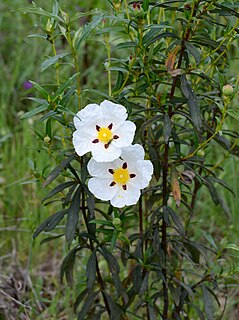
Cistus ladanifer is a species of flowering plant in the family Cistaceae. It is native to the western Mediterranean region. Common names include gum rockrose, labdanum, common gum cistus, and brown-eyed rockrose.
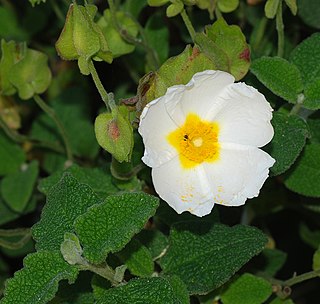
Cistus salviifolius, common names sage-leaved rock-rose, salvia cistus or Gallipoli rose, is a perennial ligneous plant of the family Cistaceae.

Cistus monspeliensis is a species of rockrose known by the common name Montpellier cistus. It is native to southern Europe and northern Africa, in the Mediterranean forests, woodlands, and scrub ecosystems of matorral—maquis shrublands.
Parafomoria cistivora is a moth of the family Nepticulidae. It is found in the western Mediterranean region.

Cistus albidus, the grey-leaved cistus, is a shrubby species of flowering plant in the family Cistaceae, with pink to purple flowers, native to south-western Europe and western north Africa.
Cistus asper is a shrubby species of flowering plant in the family Cistaceae with purple-pink flowers. It was first described in 2005 and is endemic to El Hierro in the Canary Islands.
Cistus chinamadensis is a shrubby species of flowering plant in the family Cistaceae, with purple-pink flowers, first described in 1991. It is endemic to the Canary Islands, where three subspecies occur on three separate islands. The species has been assessed as endangered in the IUCN Red List, being known only from small separated areas and facing a variety of threats.

Cistus clusii is a shrubby species of flowering plant in the family Cistaceae, with white flowers, native to south west and south central Europe and north Africa. It has been wrongly called Cistus libanotis by many authors.
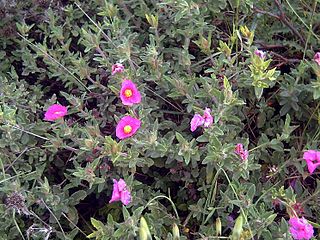
Cistus crispus is a shrubby species of flowering plant in the family Cistaceae, with pink to purple flowers, native to south-western Europe and western north Africa.

Cistus heterophyllus is a shrubby species of flowering plant in the family Cistaceae.
Cistus horrens is a shrubby species of flowering plant in the family Cistaceae, with purple to pink flowers. It is endemic to Gran Canaria in the Canary Islands. First described as a species in 2004, it was previously identified as Cistus symphytifolius, which it resembles.
Cistus inflatus is a shrubby species of flowering plant in the family Cistaceae, often known as Cistus psilosepalus, although this name is a synonym of the hybrid Cistus × laxus. It has white flowers.
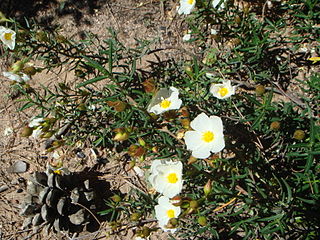
Cistus libanotis is a shrubby species of flowering plant in the family Cistaceae, with white flowers. It has been confused with Cistus clusii, which it resembles, resulting in some uncertainty in its distribution. Within Europe, it is native to south-west Portugal and south-west Spain.

Cistus munbyi is a shrubby species of flowering plant in the family Cistaceae, with white flowers. Related to and resembling Cistus clusii, it is native to Morocco and Algeria in western north Africa.
Cistus ocreatus is a shrubby species of flowering plant in the family Cistaceae, with purple-pink flowers. It is sometimes treated as synonymous with Cistus symphytifolius or as its subspecies C. symphytifolius subsp. leucophyllus. Its name is sometimes spelt Cistus ochreatus. It is endemic to Gran Canaria in the Canary Islands.
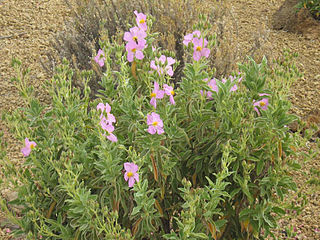
Cistus osbeckiifolius is a shrubby species of flowering plant in the family Cistaceae, with pink to purple flowers.

Cistus symphytifolius is a shrubby species of flowering plant in the family Cistaceae. It is endemic to the Canary Islands".

Helianthemum canariense is a species of flowering plant in the family Cistaceae, native to Western Sahara, Morocco and the Canary Islands.













